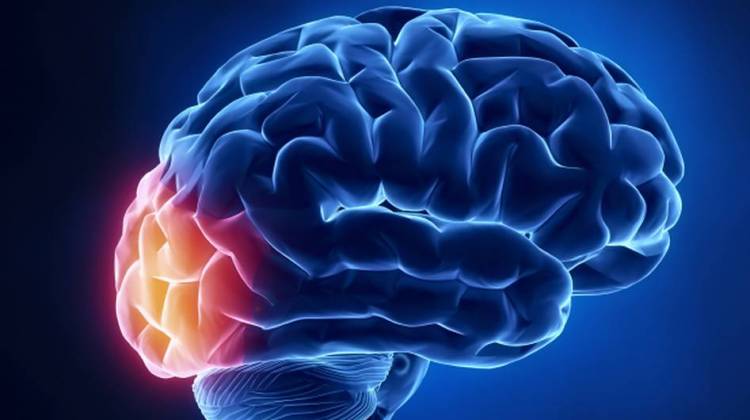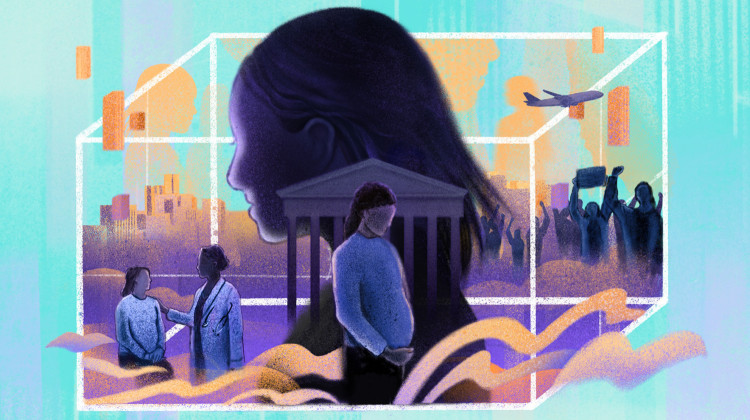Here's a medical mystery that begins with a kindergarten teacher. We're not using her full name to protect her medical privacy, so we'll call her M.
M. taught reading to 4 and 5-year-olds at a school outside Chicago, but two years ago something happened to her that changed her life: she lost the ability to read.
Her problems began a few days before Halloween. M. was helping out at a Halloween party put on by the local park district, selling tickets at the front desk.
Over and over, she incorrectly counted the number of people who approached the desk, and asked for the wrong amount of money. That week, she got lost driving in a familiar neighborhood, and her mother noticed she was confused about dates and times. It was all very uncharacteristic for the independent, 40-year-old teacher.
About a week after it began, M. was trying to take attendance at school when she realized she couldn't type the numbers and letters of her computer password. When she finally got to the hospital, she found out she had been experiencing a series of strokes.
Dr. Murray Flaster is one of the doctors who has treated M. at Loyola Medical Center in Chicago. "We believe she had an inflammation of blood vessels in the brain," he says. "And that inflammation led to the cutoff of bloodflow to a few areas in the brain."
As M. recovered, her most striking symptom was that she could write, but she couldn't read. For example, Flaster says, "If you give her a book and ask her to read it, she knows it's a book, she knows there must be letters on the page, she knows there are words there, but she cannot recognize letters and put letters into words."
The disorder is called alexia. The strokes damaged the connection between the part of M.'s brain that takes visual information from her eyes and the part that deciphers words. But M. can still understand language in other ways. She can listen to audiobooks and write stories. She still has good reading comprehension, even though she can't read.
"I miss the normalcy of it," she says. "I miss functioning in the world. There are so many things in the world you take for granted. I never thought I would say reading is something I took for granted."
As M. went through rehabilitation, she came up with a way to re-teach herself how to read. Instead of relying on her eyes, she used touch to understand words.
When M. sees a jumble of shapes that look like a word, she begins by tracing each letter with her finger. As she traces each letter, she goes through the alphabet in her head or out loud until she knows what letter she's tracing. It's a very slow, laborious way to read, but it works.
Flaster doesn't know how M. came up with this method, but he is impressed that she did.
"She discovered that all by herself," he says. "We speculate that the fact that she was an expert in teaching children how to read perhaps made her more likely to discover that than someone else who might be stricken similarly."
M. isn't the first to come up with the tracing method. Dr. Rhonda Friedman and her team at Georgetown University's Center for Aphasia Research and Rehabilitation have taught other patients to use tracing to read after similar brain damage.
Friedman says one patient made significant gains. "Over time, we saw that he was not only tracing the letters, he was actually recognizing them individually without any movement of his fingers, or at least that we could see," she says. "Something was becoming automatic, but we don't know what it was."
Because M. was just 40 years old when she developed alexia, it is hard to know just how much better her reading might get with hard work, but it's a long road. Two years after her strokes, M. can decipher about one word every two seconds.
But she's not letting it slow her down too much. She has a new job, working at the community gym, and she wants to tell her story. In her free time, M. is writing a book, typing it word-by-word and getting friends to help her read it.
9(MDEwMDc1MzM3MDEzNDczOTA0MDc1MzViMQ001))
 DONATE
DONATE








 View More Programs
View More Programs

 Support WFYI. We can't do it without you.
Support WFYI. We can't do it without you.